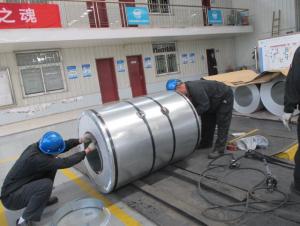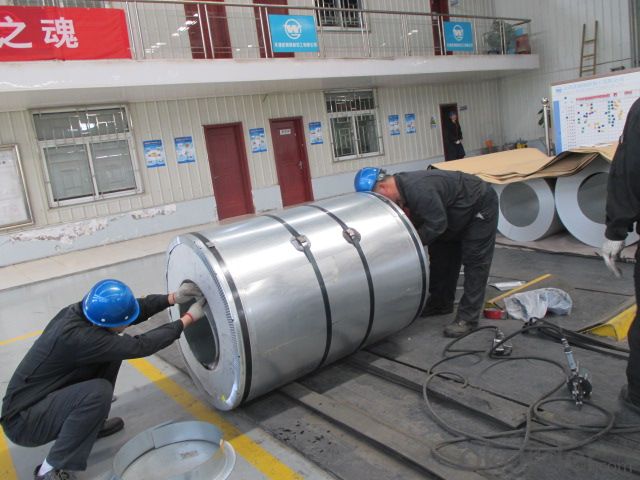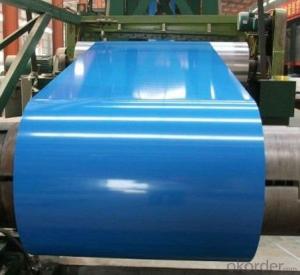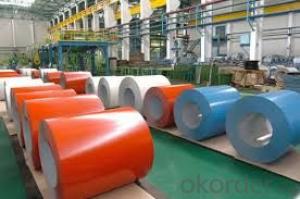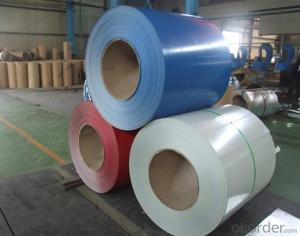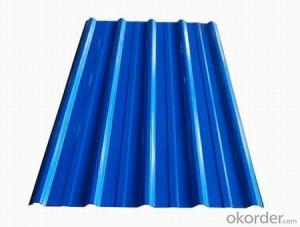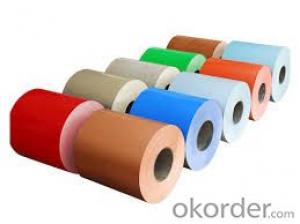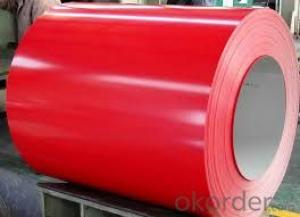PPGI/PPGL-Various color - 0.13-1.2mm/ Color Coated Steel/Roofing ppgi
- Loading Port:
- Shanghai
- Payment Terms:
- TT OR LC
- Min Order Qty:
- 10 m.t.
- Supply Capability:
- 100000 m.t./month
OKorder Service Pledge
OKorder Financial Service
You Might Also Like
1) AVAILABLE DESIGNATION OF (Prepainted galvanized steel coils) printed PPGI coils
Quality | Q/BQB 440-2003 | JIS G3312-1994 | EN 10326-2004 | ASTM A653-02a |
EN 10327-2004 | (BASE PLATE) | |||
(BASE PLATE) | ||||
Commercial Steel | TDC51D | CGCC | DX51D+Z/AZ | CS Type A/B/C |
Forming Steel | (TSt01,TSt02,TSt03) | CGCD1 | FS Type A, Type B | |
Drawing | TDC52D /TDC53D | - | DX52D+Z/AZ | DDS TYPE A/C |
Steel | DX53D+Z/AZ | |||
Structural | TS280GD(TStE28) | CGC400 | S280D+Z/AZ | SS275 |
Steel | TS350GD(TStE34) | CGC440 | S350D+Z/AZ | SS340 Class1 |
2) OUR SPECIFICATION OF (Prepainted galvanized steel coils) printed PPGI coils
Available Size:
Thickness | Width | Length of plate | Inner diameter of coil | |
| 0.2-1.2mm | 800/914/1000/1200/1219/1250mm | 1000-6000mm | 508mm/610mm |
- Q: in a lab at school we did heat treatment of steelwhat are the possible phases present in the steel sample in as-received, as-quenched and as-tempered conditions? specifically when is it ferrite, austenite and pearliteis the steel originally in the ferrite phase? then when headed turns into austenite and when quenched martensite is formed and when tempered cermentite is formed...........where is pearlite involved and am i correct about the ferrite?
- hey from what i learned in uni last sem, steel is originally ferrite form at first at room conditions. it will undergo poly morphic transformation to become FCC structure austenite form at 912 degree celcius. under conditions, it can become pearlite (which is a combination of ferrite and cementite) or bainitie( a finer form of pearlite). queching conditions to room temperature will form martensite which is the strongest but brittle steel form. tempered cementite is formed when we quench it and then raise temperatures before sir cooling. hope it helps, pls vote me best answer is i deserve it. thanks
- Q: How many types of steel buildings are there?
- There are a number of designs which can be used to create different types of steel buildings as per the demands of the buyer or an investor. he various kinds of that can be constructed using steel are Homes, Hangars, Agriculture and Farm buildings for storage, Garages and Storage sheds, Open air sheds,, Barns, Arenas and stadiums, Automotive buildings with overhead doors and flexible framed openings, Religious buildings such as Churches and Temples, etc.
- Q: I need to know the density of steel as one of my physical properties of steel. Any answers? If u have more physical or chemical properties of steel, that would help to thanks.
- The short answer to your question is that the density of plain mild steel is 7.85. The long answer is that depending on where you look, or the grade of steel that you are talking about can change this value. A density of 7.88 is often quoted for mild steel as well. If you add alloying elements such as tungsten, chrome or manganese to improve the steel, the density will change. So the long answer is that the density of steel can vary between 7.75 and 8.05.
- Q: Can steel coils be customized according to specific requirements?
- Yes, steel coils can indeed be customized according to specific requirements. Customization can include adjusting the size, shape, thickness, and even the chemical composition of the steel coils to meet the specific needs and preferences of customers.
- Q: Specifically, for the main support beam found in a basement.
- Steel is better. You can use a smaller size compared to wood, it will handle more weight and will not deflect like a lam beam can and will. I've worked in a lot of older houses and the ones with steel beams always had far less differential settling than those with wood beams.
- Q: As we all know Shaq killed the movie Steel by suckin so bad but does anyone know what happened to the comic book version.
- Was cancelled after the 25th issue or so....the movie probably killed the comic too!
- Q: What is the standard diameter of steel coils?
- The standard diameter of steel coils can vary depending on the industry and specific application, but it is typically between 24 to 72 inches.
- Q: Where can I find a great deal online for Danesco Stainless Steel Egg Poacher
- Cheapest place to buy Danesco Stainless Steel Egg Poacher is amazon, and the price is $34.99. For more information check the link below....
- Q: What is the average flatness tolerance for steel coils?
- The average flatness tolerance for steel coils typically ranges between 0.25% and 0.5% of the coil's width.
- Q: What are the different types of steel coil handling devices?
- There are various types of steel coil handling devices, including coil lifters, coil tongs, coil hooks, coil grabs, and coil carriages.
Send your message to us
PPGI/PPGL-Various color - 0.13-1.2mm/ Color Coated Steel/Roofing ppgi
- Loading Port:
- Shanghai
- Payment Terms:
- TT OR LC
- Min Order Qty:
- 10 m.t.
- Supply Capability:
- 100000 m.t./month
OKorder Service Pledge
OKorder Financial Service
Similar products
Hot products
Hot Searches
Related keywords
